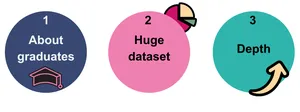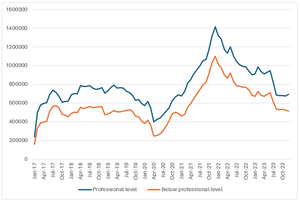Supporting the students of tomorrow
By taking part in the Graduate Outcomes survey, your voice helps shape the future of student support. Learn how your experiences guide universities and policymakers to better understand graduate journeys and improve opportunities for those following in your footsteps.
At Jisc, we have many responsibilities within the further and higher education sectors. One of them is the development of labour market information – this is data and statistics on jobs. In other words, we help colleges and universities give support to students in understanding what they can do with their qualifications and how to get there.
The most important data we use for this is the Graduate Outcomes survey. This is the most complete data available on the labour market for graduates from higher education institutions. The latest survey results for the class of 2021/22 have recently been released (13 June 2024) as accredited official statistics.
Why is the data so valuable?

Graduate Outcomes stands out for a number of reasons. The first, and most obvious, is that it’s about graduates – it isn’t always easy to find data just on graduates through other sources.
The second is coverage. The Graduate Outcomes dataset is huge, one of the largest surveys conducted in the UK every year, and the latest release from the class of 2021/22 contains nearly 400,000 responses which gives us a huge amount of data to work from. We can also be confident in the responses being representative of the whole graduating group, following investigations around weighting and non-response bias.
The third reason this data is so useful is depth. The sheer range of questions covered means we can get valuable evidence, in detail on what graduates do (not just their employment – we get a lot of data on further study), the jobs they get (including on self-employment and lots of interesting data on graduates who have multiple jobs), where they did those jobs, why they chose them and the contracts that they’re doing them in. You want to know how many graduates doing other things also had a side-job in the creative arts or IT? Graduate Outcomes can tell you. We also ask some very interesting questions on whether graduates think they’re doing something meaningful or using their skills.
So we know, for example, that most graduates doing jobs considered to be below professional level think they’re nevertheless doing something worthwhile. It also shows that not all graduates who are in outcomes considered a success actually think what they are doing is meaningful. The data shows us that although you think money is obviously important, other factors like doing things you think are socially valuable, or in your home community, or which might just help you down the line to the career you really want are just as important, if not more so.
Supporting a new generation of students
If you’re a recent graduate, the Graduate Outcomes team will be in touch about 15 months after you complete your course and will ask you these questions. It isn’t so we can track you for loan repayments or the like! It’s so we can get the data together to give good, targetted, relevant support to new students and be as sure as we can be that the evidence shows it will be valuable.
This means that through the survey, graduates tell us things that really help your colleges and universities. They can give better, more meaningful support, advice and guidance to the next generation of students, and why it’s so helpful to them that you complete the survey online or by phone when you’re invited.
What does the data tell us about the class of 2021/22?
Well, the first is that unemployment for UK graduates went up (a little) and employment went down (a little) compared to the previous year’s graduates. This might seem unexpected – the previous cohort graduated in 2021 with COVID still a big issue, whilst this cohort graduated in 2022 with it in the rear view mirror, at least in terms of lockdown and other business and social restrictions.
This data on vacancies from the Office for National Statistics (ONS) gives a succinct explanation of what happened:

The graph shows the number of online job adverts between January 2017 and October 2023 split between professional and below professional level. It shows vacancies (of both types) at a low in April 2020 and a peak in late 2021. Since this peak, vacancies show a slow decline into October 2023. The source of this data is the Office for National Statistics.
Lockdown restrictions were lifted UK-wide in May 2021, and businesses, particularly in business services and tech who had found that remote working had been more successful for them and their clients than expected, recruited en masse. This saw graduate level vacancies peaking in late 2021, just as the previous cohort were seeking jobs. This cohort graduated into a jobs market that was (and actually still is from the subsequent data we have) stronger than pre-pandemic, but which wasn’t running quite as hot as previously.
By the time the cohort were surveyed, at the far right hand side of the graph, the jobs market had declined (although it had probably flattened out by winter, rather than carried on declining). Although the jobs market for graduates was still relatively strong in historic terms, it was not quite at the same heights. And we will be able to use Graduate Outcomes data to examine exactly how things had changed, which industries and occupations were most affected and what graduates thought about it all, to get the richest possible picture to help institutions make plans and support students effectively.
If you’re due to take the survey this year, I hope this insight demonstrates the value of your response to the education sector. If you’d like to see a selection of headlines statistics from the class of 2021/22, visit the previous results page: